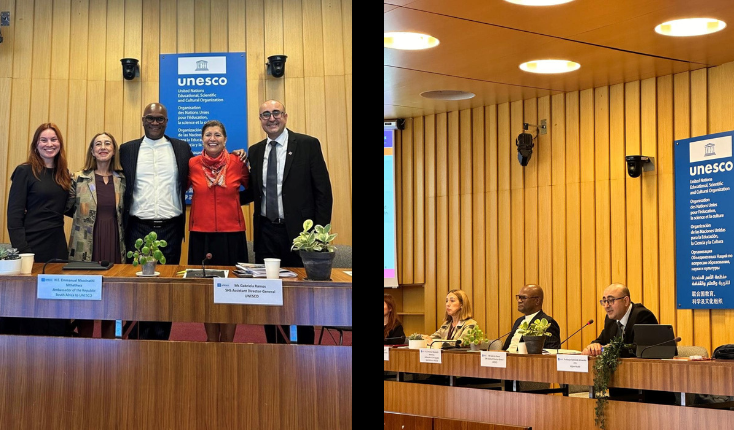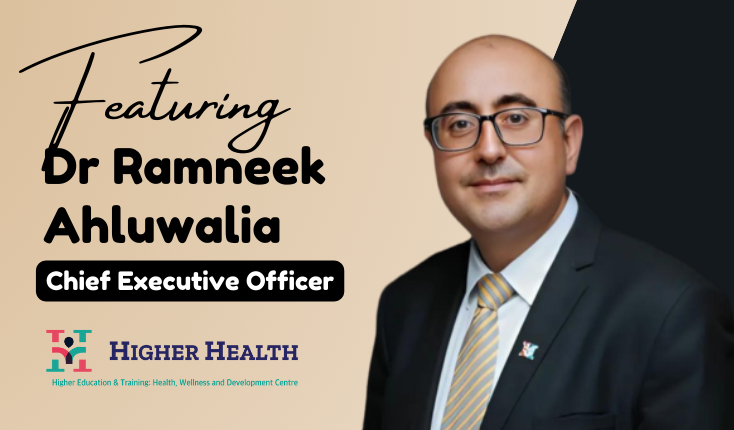Ramneek Ahluwalia
Dr. Ramneek Ahluwalia, CEO of Higher Health, is leading a transformative mission to equip South African youth with Skills for Life and Soft Skills essential for personal and professional growth. Higher Health, operating under South Africa’s Department of Higher Education and Training (DHET), provides holistic health, wellness, and psychosocial services to over 2.5 million students across universities, TVET colleges, and CET colleges. Their Skills for Life and Soft Skills programme, accredited at NQF Level 5 through the Qualifications Certificate Trades Occupation (QCTO), teaches vital workplace competencies, including empathy, conflict resolution, digital literacy, teamwork, and time management, aiming to improve employability and life readiness. Prof. Ahluwalia’s vision emphasizes resilience, equality, and social responsibility, particularly through efforts to combat gender-based violence (GBV) and support mental health on campuses. With notable partnerships, such as with UNESCO, Higher Health is pioneering initiatives like the “Transforming MEN’talities” project, addressing GBV prevention and empowering students with essential Skills for Life and Soft Skills to thrive in diverse, challenging environments.
A Journey of Purpose
We started the interview by asking, “Can you tell us about your journey and what inspired you to focus on healthcare, particularly in South Africa?”
Dr. Ramneek Ahluwalia replied, “My journey in healthcare began in India, where I earned my medical degree, and later expanded globally with my work in countries like Germany and Mauritius. South Africa, however, provided a unique challenge and opportunity due to the magnitude of health and social issues here, particularly HIV, TB, Gender-Based Violence (GBV), teenage pregnancy, maternal death and mental health crises among others. I was inspired by the resilience of the people and the need to transform health systems to be more equitable and effective. My focus is on building a healthcare infrastructure that not only treats but also educates and empowers students and youth of South Africa.”
Positioning Higher Health
The UK Times: In your perspective, how would you describe Higher Health as an organisation, and where does it currently stand within its market?
Dr. Ramneek Ahluwalia replied, “Higher Health is a national agency of the Department of Higher Education and Training (DHET) in South Africa. Its primary mission is to inspire success and promote holistic health, well-being and psychosocial support services in 2.5 million students across 26 universities, 50 public Technical and Vocational Education and Training (TVET) colleges, and 9 Community Education and Training (CET) colleges.
Higher Health has established the Skills for Life and Soft Skills online programme accredited at NQF Level5 by the QCTO in South Africa and also in partnership with the Health and Welfare SETA (HWSETA). The accredited programme offers the Top 10 Soft Skills of the workplace while building resilience amongst our young people at early stages of development.
Top 10 Soft Skills of the workplace, such as:
- Empathy, Listening and Counselling;
- Civic Responsibility and Peer Education;
- Conflict Resolution;
- Creativity, Critical Thinking and Problem Solving;
- Decision Making;
- Digital Literacy;
- Presentation Skills, Public Speaking and Communication;
- Resilience, Confidence and Self-Motivation;
- Teamwork, Organizational Skills and Leadership Skills; and
- Time-Management and Goal-Setting
As a bridging or exit course across our sector it aims towards building Skills for Life and Soft Skills for better employability and complementing every hard skills offered by Universities and Colleges that will help better economic productivity. This unique first of its kind – NQF Level5 programme is built in all South African major languages including now the sign language.
Soft skills are needed in bridging our skills gap – an attempt to build a nation that has gone through a lot!”
Empowering Youth Globally
The UK Times: Can you tell us about your vision and impact of the Skills for Life and Soft Skills online programme? How is Higher Health working to ensure that young people around the world gain access to essential skills that not only improve employability but also contribute to their overall growth and well-being?
Dr. Ramneek Ahluwalia replied, “My passion is in empowering every young person with the skills they need for life – skills that go beyond academics or vocational training. I’m honoured to say that Higher Health is now acknowledged globally as a key partner of UNESCO, making us Africa’s second leading nonprofit partner for UNESCO. My vision is that the United Nations’ 17 Sustainable Development Goals (SDGs), also known as the Global Goals, shouldn’t just stay at the policy level among decision-makers. They need to reach every young person directly, in ways they can relate to and understand, ideally in their language of choice.
So, we’re working to make the Skills for Life and Soft Skills online programme accessible at a basic literacy level to bring these Goals to life for youth. We believe that every life matters, every young person matters. Skills for Life are the future of employability, the future of being a parent, and the cornerstone for the next generation. This generation needs to adapt to welcome and mentor the new generation, and we can only achieve that through a transformative approach.
Through this programme, we’re providing certificates, quality-assured and UNESCO-endorsed systems, all in their chosen language. But we’re also addressing critical issues that affect their lives – gender awareness from early ages, mental health, resilience, prevention of substance abuse, climate change consciousness, civic responsibility, protecting our democracy, digital and AI literacy, ethics, financial literacy, and support for disability inclusion. Higher Health specializes in teaching soft skills to help them thrive.
Our students are learning conflict management, time management, goal setting, empathy, critical thinking, and problem-solving. These are the skills today’s workforce needs, to be balanced and adaptable. Hard skills alone are no longer enough; they must be complemented by these soft skills. With each of these competencies, we’re building resilience in young people. As a result, we’re making their CVs stand out to employers by adding micro-credentials, credits, and certificates, all easily accessible on mobile devices and applications. This is the revolution we’re championing – empowering youth, strengthening employability, and shaping tomorrow’s leaders.”
Structure of the Skills Qualification
The UK Times: Can you explain the structure of the Skills for Life and Soft Skills online qualification?
Dr. Ramneek Ahluwalia replied, “The qualification is divided into eight comprehensive modules, each designed to address different challenges that youth face today. These modules include Civic Education, Gender Education, Mental Health, Disability, Sexuality Education, Substance Abuse and Resilience, Climate Change, and Financial Literacy. Each module is credit-bearing. After the successful completion of each module, a student receives a Certificate which can be added to their Curriculum Vitae (CV) and also shared on their professional and social networks such as LinkedIn.”
Transforming Student Health
The UK Times: Higher Health has become a leader in addressing student health, wellness and psychosocial support in South Africa. What do you consider the organization’s most significant achievement so far?
Dr. Ramneek Ahluwalia replied, “One of our most significant achievements has been the successful integration of holistic health, well-being and psychosocial support services into the Post-School Education and Training (PSET) sector. Our programmes reach over 2.5 million students annually in 26 public Universities, 50 Technical and Vocational Education and Training (TVET) Colleges and 9 Community Education and Training (CET) Colleges across South Africa, providing crucial services like primary healthcare, HIV testing, mental health support, and gender-based violence (GBV) interventions among others.
Our partnership with UNESCO, as we have become an implementing partner towards the Transforming MEN’talities initiative and Soft Skills programme through our innovative Skills for Life and Soft Skills qualification and modules, is a groundbreaking movement led by South Africa, with the world looking on as this pivotal moment unfolded.
The partnership with UNESCO has launched successfully with over 88 Ambassadors and permanent delegates of UNESCO from different countries, all in support of South Africa’s efforts in transforming gender equality. South Africa is showing the world how it’s done – a way to do it, with 88 countries rallying behind the Transforming MEN’talities initiative. Together, we are making global strides and pioneering a movement for gender equality and lasting change!”

Tackling Gender-Based Violence
The UK Times: What is the most pressing challenge that Higher Health faces today, and how are you tackling it?
Dr. Ramneek Ahluwalia replied, “The most pressing challenge we face today is gender-based violence. The Post-School Education and Training (PSET) sector is home to over 2.5 million youth, including more than 51% adolescent girls and young women, and faces a serious GBV crisis. The statistics are alarming, with South African women experiencing a lifetime risk of 45.6% for GBVF, well above the global average. Furthermore, 10% of all reported rape cases in the country occur within the higher education sector, underscoring the urgent need for intervention.
Higher Health’s presence across all campuses in TVET Colleges, Universities and CET Colleges in South Africa ensures our commitment in tackling this pandemic. Over the past two years, more than 350,000 students have participated in the Higher Health Transforming MENtalities & Soft skills curriculum. In 2022-2023 period over 316,048 students engaged in Transforming MENtalities dialogues with over 219,316 young people voluntarily undergoing a Gender and Intimate partner Violence risk assessments tool kit with Higher Health And with 18,994 young people identifying themselves at high-risk for GBV. Over 12,682 young lives reported GBV and are linked to psychosocial counselling and where necessary legal and judicial support through this programme. Higher Health’s efforts aim to prevent toxic relationships and save lives through early identification and support. Early intervention Saves lives!”
Key Milestones & Transformative Experiences
The UK Times: Can you share the key milestones and experiences that have shaped your successful career over the past two decades?
Dr. Ramneek Ahluwalia replied, “My journey has been a tapestry woven with significant milestones and meaningful experiences. At its core, I began as a medical doctor, a role that not only bestowed upon me the knowledge of healing but also instilled a profound sense of humility and a human-centric approach in my leadership style. Writing the inaugural chapter for the BRICS academic forum, launched by former President Zuma, marked a pivotal moment, opening doors to cross-border collaboration and my involvement in ministerial task teams in South Africa. My close association with esteemed United Nations (UN) agencies like World Health Organisation (WHO) and UNESCO allowed me to champion transformative girl education and gender equality, speaking at global forums such as the Global Citizen Forum and the UN CSW.”
Leadership Lessons
The UK Times: What advice would you, as an established leader in the industry, offer to emerging leaders who are looking to make their mark and succeed in their respective fields?
Dr. Ramneek Ahluwalia replied, “The advice I would like to impart to emerging leaders is to embody humility, embrace patience, and be perpetual learners. Remember, as a leader, your role is to uplift and empower those around you, and to truly understand them, you must learn from them and be the people you aim to lead.”
Vision for the Future
Lastly we asked, “Looking ahead, what are your long-term goals for Higher Health, and how do you see it evolving in the next 5-10 years?”
“In the next 5-10 years, I see Higher Health expanding its reach and impact, not just in Africa but across the globe. We aim to continue growing our holistic health, well-being and psychosocial support services and educational programs, with a focus on integrating digital health solutions and making healthcare more accessible. We also want to further develop our partnerships with international organizations like UNESCO to ensure that our programs are globally recognized and continue to set new standards in student health, well-being and psychosocial support services. My ultimate goal is to create a generation of young people who are not only academically and professionally prepared but also healthy, resilient, and socially responsible.” Dr. Ramneek Ahluwalia Concluded
Article Resource: Dr. Ramneek Ahluwalia
Connect Dr. Ramneek Ahluwalia on LinkedIn
Visit Higher Health to learn more about it
Also Read:
Maria Stoeva Interview A Human-Centric Approach to Strategic Thinking
Harnessing Global Expertise with Modesto N Peña Y Gorrin
Awe to Innovation with Ragnhildur Ágústsdóttir Aka. LadyLava























